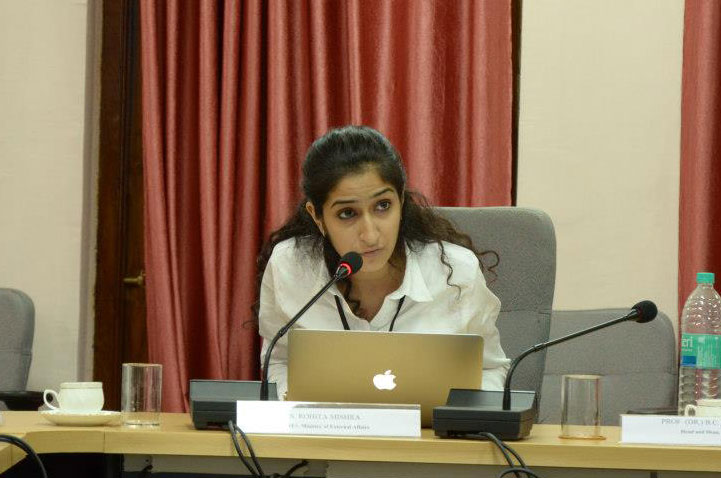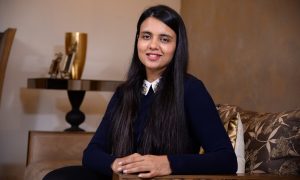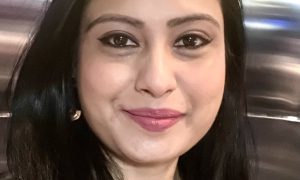Guneet Kaur graduated from HNLU, Raipur, in 2012. Subsequently, she went on to become a Research Affiliate for the Project on Armed Conflict & People’s Rights, at the Haas School of Business, University of California, Berkeley, before deciding to pursue her Master’s Degree in Human Rights in Conflict Zones, from the University of California, Berkeley.
In this interview we talk to her about:
- Her interest in human rights
- Being a judicial clerk
- Her curriculum at Berkeley
Why did you decide to study law?
I grew up in a Sikh family listening to stories from my parents about 1984, Operation Bluestar and the disappearances in Punjab during the insurgency. But it was after the riots of 2002,that I realized the true extent of what my parents told me about state complicity and mass atrocities. So, I decided then that I wanted a career where I will have the power to be vocal when injustice happens. And, Law was not a difficult choice.
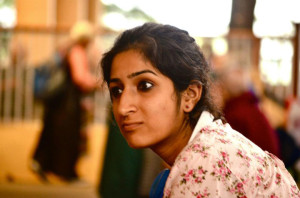 HNLU has been very shabbily treated by the state government and its consecutive administrations. While resources and infrastructure have drastically improved over the last two years, but times were quite tough during the tenure of my batch and batches senior to us. Every law school analyst had written us off. Law Firms were not very interested in coming to our campus. However, all of this made the student body at HNLU exceptionally strong and hard working. Lack of resources wasn’t an acceptable excuse. We went on a hunger strike to get our new campus. If law firms weren’t coming to campus, we worked really hard to secure PPOs.
HNLU has been very shabbily treated by the state government and its consecutive administrations. While resources and infrastructure have drastically improved over the last two years, but times were quite tough during the tenure of my batch and batches senior to us. Every law school analyst had written us off. Law Firms were not very interested in coming to our campus. However, all of this made the student body at HNLU exceptionally strong and hard working. Lack of resources wasn’t an acceptable excuse. We went on a hunger strike to get our new campus. If law firms weren’t coming to campus, we worked really hard to secure PPOs.
We would spend our vacations working in the law libraries in Delhi because our law school library then didn’t have most of the books we needed. My team won Henry Dunant when the library at HNLU only had one book on international humanitarian law in 2010. The story was pretty much the same for most other mooting teams but that didn’t stop us from making our mark in mooting or academic publishing. In a way we all inspired one another. By the time we were in the last semester we had not just bounced back to existence; we were in fact doing really well and still are. Those five years on the whole have been a very important life lesson.I will look back to them whenever I need inspiration.
What motivated you to work with the ICRC and the Alternative Law Forum?
People working in the field of human rights can be doing different kinds of jobs in different set-ups. There is research, advocacy, scholarship, litigation and then the combinations of any two or more. I wanted to explore the different platforms available to figure out my comfort zone. So, I interned with different number of organizations and people.
ICRC generally does not take LLB students for internships but my teammates and I won the Indian and South Asian rounds of Henry Durant Moot and we were runners-up at the International Red Cross Moot. That formed a very close association with the organization and I eventually convinced them to give me a chance. It was a research based desk internship that paid well.
Alternative law Forum was one of my dream law school internships. I was always fascinated by the work that these young group of lawyers were doing in Bangalore. ALF has an application procedure, which I filed and got through. ALF actually uses pretty much all the tools in human rights work, which makes the whole experience very productive.
Tell us about your experience being a judicial clerk.
(Guneet has worked at the offices of Trideep Pais and Justice S.S. Nijjer.)
Every day in Litigation is packed with a new drama and excitement. Internships spent in courtrooms have been my favourite part of law school. I interned under Trideep Pais thrice and I also interned under Nitya Ramakrishnan and Akshay Bhan. As a matter of policy, I always chose small and mid-sized litigation offices. All three of them were very approachable and never made me feel like an intern. I got a lot of quality work and was appreciated. Junior counsels at all these offices were relatively young. So there was normally no hierarchy and I was treated like a peer, which, personally for me, made learning very easy.
Mr. Pais is a very humble man and a very intelligent lawyer,who takes a special interest if he finds the intern is quite interested in learning. His practice is very diverse and spreads across different levels of courts in Delhi. I have worked with him preparing strategies for cross examinations, sat through conferences with senior advocates, drafted SLPs, filed and inspected documents etc. Even if I was just researching for a particular matter, in case of a briefing to a senior counsel, I would be asked to speak in the conference or if the client liked the point Mr. Pais would make it a point for the client to know that the particular legal point was found by me. I think this kind of environment, wherein, the intern is so involved in major office work and everybody in the office acknowledges his/her work is very rare for a litigation office in India. I have enjoyed every minute that I have worked there.
Under Nitya Ma’am, I got a chance to work on some high profile human rights matters, such as the Salwa Judum case and the American Center firing case. This was in a way my first internship in a litigation office, and reading about the cases one is working on in the newspapers can be a source of great happiness for a second year dreamy-eyed law student. But I guess the main take-away from that internship was that in Nitya Ma’am, I found a role model that I really needed. While conversations with her during as well as after the internship have been very memorable but it was observing her go about her work that had its impact on me.
I think one-month judicial clerkships don’t contribute much to one’s learning curve or one’s CV. If someone is interested in clerking for a judge for a longer term, then a one-month clerkship makes sense to get an idea. I may be wrong but I think there is not much to learn by preparing bench memos all day long or simply observing court proceedings.
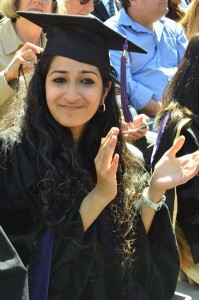 When did you finally decide that you need to do masters?
When did you finally decide that you need to do masters?
I went to Oxford for a diploma in international human rights law before the beginning of my fourth year. I had already been volunteering for civil society organizations in Chhattisgarh. Till that point I had not really given LL.M a serious thought but in Oxford I realized that to work in insurgency zones and talk about conflict related violence, I needed better knowledge and understanding of international human rights tools and a vocabulary that the LL.B programme didn’t teach at all. And I realized I needed an LL.M.
How did you choose the university/college?
I was looking at schools with a well-established human rights clinic that was open to LL.Ms. I knew I really needed a human rights clinical education programme to achieve the learning goals I had set for myself out of an LL.M. Harvard, Columbia and Berkeley were the only three law schools that offered clinical programs to LL.Ms. Berkeley being the world’s best public university with its legacy of social justice movements was my dream school as a kid. I was also working with the Armed Conflict project at Berkeley as a research ex-tern at that time and I wanted to continue it. Additionally, Harvard sent me a very sweet rejection letter. I think before applying for LL.Ms, you need to be very clear about your reasons for doing an LL.M and what you want to get out of it. Every school will offer certain specializations. Once you are clear about what you are looking for, you need to find out what different law schools are offering. Picking up schools becomes easy after that.
Does University of California provide students with scholarships?
There is some partial aid but being a public university, Berkeley does not have major financial aid programs for LL.Ms. There are many institutions that provide scholarships like Inlaks, Microsoft scholarship, Fulbright scholarships etc.
Share some insights on the topic Armed Conflict and People’s Rights.
The project is working for armed conflict resolution in conflict zones of South Asia and is developing protocols for observance of human rights and humanitarian law in the conflict zones. I began working for the project as a research extern in my fourth year. As an extern I was collecting documentation concerning human rights violations in South Asian conflict zones and preparing memos based on that data. Once I shifted to Berkeley, I was promoted as a project research associate wherein my task was analyzing how transitional justice mechanisms worked in Latin American countries and preparing research memos.
Did you undergo a rigorous academic schedule?
There was a lot of flexibility given to students for choosing the number of credits they wanted to at Berkeley. It depends on the student how much academic load s/he wants to take. All US law schools use a Socratic method for teaching, wherein unlike the lecture method in India, the professor is not going to give a lecture but facilitate a discussion. A proportion of the grade is allocated for class participation and if you haven’t done the readings then you won’t be able to participate. Besides, all the discussions are so interesting that you really don’t want to sit clueless listening to everybody else. I had taken the maximum credits allowed and therefore, my schedule was very packed from Monday through Thursday. I had an average of 500 pages to read on a given school day and some school days would start at 8 a.m. in the morning, ending with the last class at 8:30 p.m.
Prof. Alexander Coward’s mail inspired thousands of students all over the world. How was your experience with faculty?
Prof. Coward’s e-mail wasn’t that well received within Berkeley. Coward’s message was that students should concentrate on their ‘education’ by attending their classes and not joining their peer graduate student instructors who were demanding a minimum wage, but in Berkeley, ‘education’ has never been just about classroom education. Berkeley holds a very important place in US history with its student moments coming out and protesting against segregation, homophobia, restrictions on free speech etc. and that’s what Berkeley’s education legacy is identified for. I think at least at Berkeley Law, it was understanding of societal injustices through these movements on campus that Berkeley Law graduates like Earl Warren or Ted Olsen later in their professional lives wrote new chapters in world civil rights history.
Most of the subjects that I took at Berkeley Law have an outstanding faculty. I was taught by very learned people whose academic and professional undertakings have gotten them an international repute and these included a sitting judge of the California Supreme Court, the former head of American Civil Liberties Union, former executive director of Physicians for Human Rights who is an international experts in war crimes investigations, a pioneer in human rights clinical education, etc. Besides, there would often be guest appearances in our classes by professors experienced in war crime and torture psychiatry, anthropologists who investigate mass graves, petitioners in some path breaking cases and prominent academicians.
How difficult was studying abroad in terms of finding accommodation, finances and settling in?
Being in a foreign country, in an intense program like Law, can be quite overwhelming. Unlike undergraduate programs, one does not have the luxury of time to “figure it out” or seniors to guide you. I was lucky to have a cousin who is enrolled in the undergraduate programme at Berkeley. So, I had some guidance in finding accommodation. However, it can be taxing too. Finances will govern a lot of your expenses. However, most campuses also have student jobs. So one can also earn while studying.
I think for a successful LL.M experience, one needs to realize at the beginning itself that s/he has nine months and set her/his priorities straight. For example for someone whomight be doing an LL.M to take a sabbatical, which is fair enough, taking too many credits is not a good idea. For someone who wants to settle in that country, it is important that the person is going for all the networking events and is doing internships at relevant places during those nine months. For people looking for jobs in International organizations, networking becomes very important.
Is there time enough for non academic pursuits?
Depends on how you define non-academic pursuits. I used to do some pro-bono work for the National Lawyers Guild (NLG) and California Asylum Representation Clinic in Berkeley. That can be a non-academic pursuit in a way. Although I always learnt a lot from the time I spent with these two organizations. While time was limited for other stuff but I knew that those nine months would never come back again. So, I usually used to reserve one night in the week to party and one weekend a month to explore California. I did not travel much beyond California because of financial considerations but whatever time I got, I used it to go around. I also had a host American family I would hang out with and have loads of fun.
Tell us about your volunteering experience while studying in HNLU.
Of the many reasons I consider myself lucky for getting HNLU, one of them is HNLU’s location in Chhattisgarh. It really helped me in developing an understanding of state sponsored human rights violations in conflict zones. While Raipur itself does not have any trace of the insurgency, but being in the capital, one cannot be indifferent to it. Some time in my second year, the trial court convicted Binayak Sen. It was a very flawed judgment and I felt helpless that being in a law school in Raipur, I wasn’t able to do anything about it. While HNLU was a very politically active campus, once the Raman Singh government came to power, administrations were changed and our students became very insular to the happenings in the state. So there wasn’t much I could do from within HNLU. I wrote e-mails to a couple of people in People’s Union for Civil Liberties and they immediately responded. Thereafter, I started attending PUCL meetings and protests regularly. Through PUCL I met some really inspiring and learned people like BinayakSen, Sudha Bharadwaj etc. While personally PUCL was a very enriching experience, it also proved very fruitful professionally. Since I was working for PUCL, a lot of other organizations like Center for Social Justice and HRLN approached me if I wanted to volunteer for them. My work with all these organisations was the reason that I got selected for an externship with the Armed Conflict Project at Berkeley. Additionally, I learnt a lot of professional skills like drafting, fact-finding, approaching a client, making representations to NHRC etc., from the time I spent volunteering.
After my first semester, I realized that even if I was at the top of my game in law school, there was nothing guaranteed and since my aim wasn’t to bag a corporate job, I wasn’t proving much to anyone or myself. Law schools in India expect you to cram the existing law and vomit them in the exam sheets. I wasn’t interested in cramming the existing laws; I was interested in evolving them for a more just society. Besides, I figured that a night before the exam and overnight paper writings were keeping me afloat. Luckily, my grades didn’t matter for Berkeley but my volunteering did get me in. I guess my answer would have been probably different had I not gotten through anywhere.
Going forward, how do you expect your experience at Berkeley will influence your career?
It already has. When I left I had no clue what I was going to do once I was done with it. Reading subjects like “Transitional Justice” and “Perpetrators, Victims, Bystanders during Mass Atrocities” and working with the International Human Rights Clinic, I realized there is so much scope for working for the realization of human rights in India especially in conflict zones. There is an absolute dearth of a human rights vocabulary and a lack of understanding of tools available to the victims and advocates.
Having grown up in Punjab and then spending five years in Chhattisgarh, state human rights abuses in conflict zones, have kind of been my call within human rights. For now I will be working on a fellowship with the Jagdalpur Legal Aid Group in Bastar. The idea is to understand the dynamics of different conflict zones such as Manipur, Kashmir, Punjab, Gujarat and Chhattisgarh for a while before venturing on my own. I want to eventually get into legal-policy and advocacy that solely focuses on transitional justice and human rights investigations in conflict zones of India.
Lastly, what would be your message to people who want to have a career in human rights?
I have not reached a stage wherein I can give a message to anyone but I will steal a line from the speech given at my Berkeley Law graduation by David Boeis. He asked all of us not to forget the reason why we joined law school. I will probably say the same thing to anyone interested in a career in human rights. A lot of us decided to go black and white, because that attire had an idea of justice attached to it. Somewhere mid-way through law school, we see our classmates running after fancy jobs and our reasons for joining law school take a back seat. Don’t let that happen to you.

